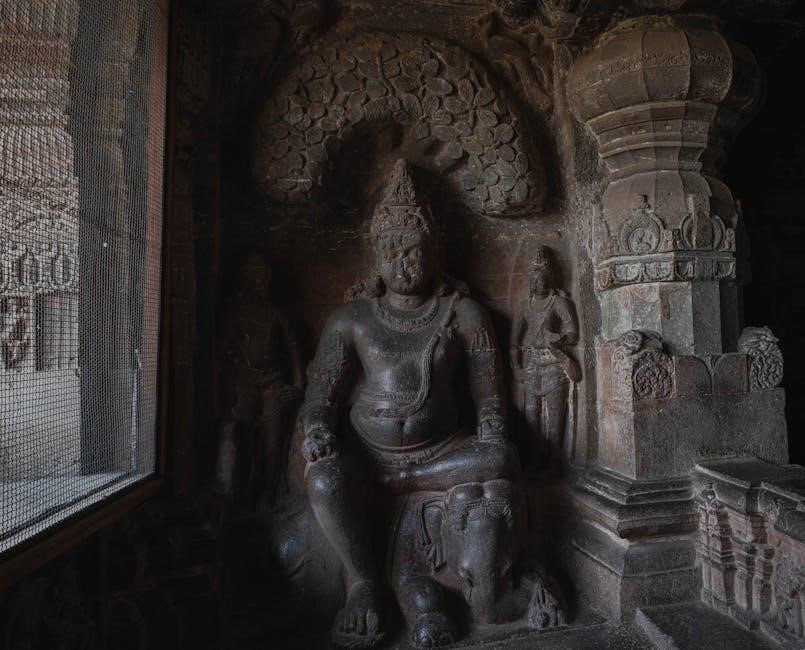George Orwell‚ a renowned English author‚ served as a police officer in colonial Burma‚ inspiring his essay Shooting an Elephant. This piece explores imperialism’s moral complexities and personal conflict.
1.1 Background of George Orwell and His Literary Work
George Orwell‚ born Eric Arthur Blair in 1903‚ was a British author‚ journalist‚ and critic known for his insightful commentary on politics and society. His early life in India and education in England shaped his worldview. Orwell’s experiences as a police officer in colonial Burma deeply influenced his writing‚ particularly in works like Shooting an Elephant‚ which reflects his critique of imperialism. His literary career began with essays and novels‚ often exploring themes of authority‚ morality‚ and individual freedom‚ establishing him as a significant voice in 20th-century literature.
1.2 Overview of the Essay “Shooting an Elephant”
Shooting an Elephant is a narrative essay by George Orwell‚ recounting his experience as a British police officer in colonial Burma. The essay centers on the moral dilemma Orwell faces when pressured by a crowd to shoot a rogue elephant that has caused destruction. Reflecting on imperialism‚ Orwell explores the internal conflict between his personal morals and the expectations of authority. The essay reveals the psychological tension of serving as a symbol of colonial power‚ ultimately critiquing the exploitation and hypocrisy of imperialism through this poignant anecdote.
Historical Context of the Essay
The essay is set during British colonial rule in Burma‚ where Orwell served as a police officer. It reflects the tensions of imperial authority and native resistance.
2.1 British Imperialism in Burma
During the 1920s‚ British imperialism in Burma was marked by exploitation and cultural oppression. The empire’s presence fueled local resentment‚ creating a hostile environment for colonial officers like Orwell. His essay captures the moral dilemmas faced by enforcers of imperial rule‚ highlighting the tension between authority and conscience. The Burmese population’s helplessness against the rogue elephant symbolizes their powerlessness under British dominance. Orwell’s experiences reflect the broader critique of colonialism‚ where the imposition of foreign power led to both physical and psychological subjugation of indigenous populations.
2.2 Orwell’s Experiences as a Police Officer in Burma
Orwell’s tenure as a police officer in Burma was marked by isolation and moral conflict. He was deeply disliked by the local population‚ who viewed him as a symbol of oppressive British rule. His experiences shaped his critical perspective on imperialism‚ as documented in Shooting an Elephant. The essay recounts his internal struggle during a pivotal incident involving a rogue elephant‚ where he felt pressured to act against his conscience. This narrative reflects his broader disillusionment with colonial authority and the ethical dilemmas faced by those enforcing imperial rule.
The Narrative Structure of the Essay
The essay follows a first-person narrative‚ creating immediacy and personal reflection. Orwell’s chronological account builds tension‚ leading to the pivotal act of shooting the elephant.
3.1 First-Person Narrative and Its Impact
Orwell’s use of first-person narration in Shooting an Elephant creates a direct and intimate connection with the reader. This narrative choice allows Orwell to express his internal conflict and moral dilemmas authentically‚ making the reader experience his hesitation and ultimate decision to shoot the elephant. The first-person perspective also emphasizes the personal nature of his reflections on imperialism and authority‚ drawing the reader into his subjective experience. This stylistic choice enhances the essay’s emotional impact and underscores the complexities of colonialism from a deeply personal viewpoint.
3.2 The Role of the Crowd in the Story
The crowd plays a pivotal role in Shooting an Elephant‚ symbolizing societal pressure and the oppressive dynamics of imperialism. Orwell feels compelled to shoot the elephant primarily due to the crowd’s expectations‚ fearing ridicule if he fails to act. The crowd’s presence amplifies his internal conflict‚ highlighting the tension between personal morality and public perception. Their influence underscores the psychological burden of colonial authority‚ as Orwell struggles to maintain his dignity and control. The crowd’s role thus illustrates how external pressures can drive individuals to act against their conscience‚ deepening the essay’s critique of imperialism and human behavior.

Key Themes in “Shooting an Elephant”
Imperialism‚ moral conflict‚ and identity struggles are central themes‚ as Orwell grapples with colonial authority and personal conscience‚ revealing the psychological toll of imperial duty.
4.1 Imperialism and Its Consequences
Orwell’s essay vividly portrays the oppressive nature of British imperialism in Burma‚ highlighting its destructive impact on both the colonized and the colonizers. The narrative reveals how imperialism fosters exploitation‚ cultural erosion‚ and moral corruption. Orwell’s role as a police officer symbolizes the British Empire’s oppressive authority‚ while the Burmese people’s suffering reflects the human cost of colonial rule. The essay critiques the hypocrisy of imperialism‚ where the colonizers justify their dominance as a “civilizing mission” while perpetuating violence and inequality. Through the shooting of the elephant‚ Orwell illustrates the senseless destruction caused by imperial power and the loss of individual morality within such systems.
4.2 Moral Dilemma and Personal Conflict
Orwell’s essay masterfully explores his internal struggle as a colonial officer‚ torn between moral judgment and societal pressure. The narrator reluctantly shoots the elephant‚ driven not by necessity but by the fear of appearing weak before the crowd. This act symbolizes the erosion of personal morality under oppressive authority. Orwell’s conflict reflects the broader ethical dilemmas of imperialism‚ where individuals sacrifice their conscience to maintain power. The essay reveals how external expectations can override moral reasoning‚ leading to regrettable actions that haunt the protagonist. This personal struggle underscores the human cost of conforming to unjust systems.
4.3 The Struggle for Authority and Identity
In “Shooting an Elephant‚” Orwell’s narrative delves into the tension between maintaining authority and preserving personal identity. As a colonial officer‚ he embodies British power‚ yet his internal reluctance to shoot the elephant exposes the fragility of that authority. The crowd’s expectations symbolize the oppressive weight of colonial rule‚ forcing Orwell to act against his conscience. This struggle reflects the broader conflict of imperialism‚ where individuals lose their autonomy to systemic oppression. Orwell’s identity becomes a pawn in the power dynamics‚ highlighting the dehumanizing effects of colonial authority and the futility of upholding a morally hollow system.

Symbolism in the Essay
The essay employs the elephant and rifle as potent symbols‚ representing colonial domination and the illusion of authority‚ respectively‚ highlighting the moral complexities of imperialism.
5.1 The Elephant as a Symbol of Imperial Power
In “Shooting an Elephant‚” the elephant symbolizes the imposing presence of imperial authority and the destructive forces it unleashes. Orwell uses the creature to represent the British Empire’s dominance over Burma‚ highlighting how colonial power often manifests as unchecked and oppressive. The elephant’s rampage mirrors the chaos and disruption caused by imperialism‚ while its eventual destruction reflects the moral and ethical dilemmas inherent in maintaining such power. Orwell’s reluctant decision to shoot the elephant underscores the internal conflict between upholding authority and confronting the brutality of colonial rule‚ ultimately revealing the hollow nature of imperial dominance.
5.2 The Rifle as a Tool of Authority
In “Shooting an Elephant‚” the rifle serves as a potent symbol of authority and imperial control. Orwell carries the rifle primarily to assert his dominance‚ even though he has no intention of using it. The weapon embodies the power dynamics of colonial rule‚ where the mere presence of a firearm is enough to command respect and fear. However‚ the rifle also symbolizes the emptiness of imperial authority‚ as Orwell feels pressured to shoot the elephant not out of necessity‚ but to maintain his image in front of the crowd. This highlights the tension between appearances of power and the moral ambiguities of colonialism.

Critical Analysis of the Essay
Orwell’s essay masterfully explores imperialism’s moral complexities‚ using irony and symbolism to critique colonial authority. His narrative reveals psychological conflict‚ questioning the ethics of power and control.
6.1 Literary Devices Used by Orwell
Orwell employs a first-person narrative to create immediacy‚ drawing readers into his moral dilemma. Irony underscores the absurdity of colonial authority‚ while vivid imagery paints the setting and the elephant’s destruction. Symbolism is central‚ with the elephant representing oppressive imperial power. Foreshadowing builds tension‚ highlighting the inevitability of the elephant’s fate. Orwell’s prose is straightforward yet powerful‚ amplifying the essay’s emotional and ideological impact‚ making it a masterclass in literary craftsmanship that resonates with themes of morality and authority.
6.2 Psychological Insights into the Protagonist
The protagonist‚ a British officer‚ reveals deep internal conflict and vulnerability. His reluctance to shoot the elephant contrasts with societal expectations‚ showcasing a struggle between personal morality and public image. The pressure from the crowd highlights his fear of appearing weak‚ a psychological burden that drives his decision. Orwell’s portrayal reveals the tension between individual conscience and colonial duty‚ offering a nuanced exploration of human behavior under oppressive systems. This psychological depth adds complexity to the narrative‚ making the protagonist’s motivations and emotions profoundly relatable.
The Impact of “Shooting an Elephant”
Orwell’s essay remains a powerful critique of imperialism‚ sparking debates on morality‚ authority‚ and conscience. Its relevance endures‚ influencing contemporary discussions on colonialism and power dynamics globally.
7;1 Reception of the Essay in Modern Times
Orwell’s “Shooting an Elephant” remains a widely studied and debated essay‚ praised for its profound critique of imperialism and human nature. Modern readers appreciate its psychological depth and moral complexity‚ resonating with contemporary discussions on power dynamics and colonialism. The essay’s themes of conscience and authority continue to provoke thought‚ making it a timeless piece in literary and political discourse. Its availability in PDF format has further expanded its reach‚ ensuring Orwell’s insights remain accessible to new generations of readers and scholars worldwide.
7.2 Its Relevance to Contemporary Discussions on Imperialism
Orwell’s “Shooting an Elephant” remains a powerful allegory in modern discussions on imperialism‚ highlighting the loss of personal freedom under oppressive systems. The essay’s themes of moral compromise and the corrupting influence of power resonate with contemporary critiques of authoritarianism and colonial legacy. Its exploration of psychological conflict mirrors ongoing debates about individual agency versus systemic oppression. As a cautionary tale‚ it underscores the dangers of unchecked power and the erosion of conscience‚ making it a timeless commentary on the human condition in the face of imperialism and political control.

Availability of “Shooting an Elephant” in PDF Format
The essay is widely available in PDF format through official publishers‚ online archives‚ and academic databases‚ ensuring easy access for readers and scholars worldwide legally.
8.1 Sources for Downloading the PDF
The essay is available in PDF format through various sources‚ including official publishers like Penguin Books‚ academic databases such as JSTOR‚ and online archives like Google Scholar. Additionally‚ numerous educational websites and literary platforms offer free or paid access to the PDF. Users can also find it on platforms like Internet Archive or through direct downloads from reputable essay repositories. Always ensure to access the PDF from legal and copyrighted sources to support the author and publishers.
8.2 Legal and Ethical Considerations for Accessing the PDF
Accessing Shooting an Elephant in PDF format requires adherence to copyright laws to avoid infringement. Ensure the source is legitimate‚ such as purchasing from official publishers or downloading from authorized platforms. Ethically‚ it is important to respect George Orwell’s intellectual property and the efforts of publishers. Using pirated or unauthorized versions undermines the value of literary work. Always opt for legal and ethical access to support the author’s legacy and the publishing industry. This approach fosters a culture of respect for intellectual property and contributes to the sustainability of literary works.
Orwell’s Shooting an Elephant remains a powerful critique of imperialism‚ offering timeless insights into moral dilemmas and the human condition‚ ensuring its enduring relevance and impact.
9.1 Summary of Key Takeaways
Orwell’s essay Shooting an Elephant critiques imperialism‚ illustrating its moral complexities and personal conflicts. The narrative explores themes of authority‚ identity‚ and the psychological toll of colonialism. Orwell’s experiences as a police officer in Burma provide a vivid backdrop for examining the dynamics of power and conformity. The essay remains a significant commentary on imperialism’s legacy‚ offering insights into human nature and societal pressures. Its availability in PDF format ensures accessibility for modern readers‚ preserving its relevance in discussions on colonialism and moral accountability.
9.2 The Enduring Legacy of the Essay
Shooting an Elephant remains a powerful critique of imperialism and human morality. Its exploration of authority‚ identity‚ and societal pressure continues to resonate‚ offering timeless insights into colonialism’s complexities. The essay’s availability in PDF format has ensured its accessibility‚ making it a staple in literary and historical studies. Orwell’s vivid narrative and moral reflections have cemented its place as a classic‚ sparking ongoing discussions about power dynamics and ethical dilemmas. Its enduring relevance underscores Orwell’s ability to capture the human condition‚ ensuring the essay’s lasting impact on contemporary discourse.



